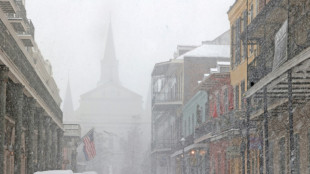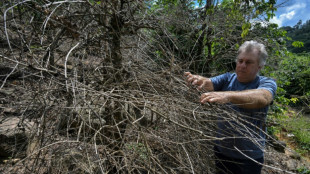

Central America braces for Tropical Storm Pilar
Central American nations braced Monday for Tropical Storm Pilar, with authorities in El Salvador reporting two deaths linked to heavy rains and wind preceding the arrival of the tempest.
Pilar, packing winds of up to 80 kilometers (50 miles) per hour, is expected to make landfall on Tuesday, threatening Pacific coast areas of Guatemala, Honduras, Nicaragua, Costa Rica, and all of El Salvador, according to the US National Hurricane Center (NHC).
"Further strengthening is expected during the next day or so, and Pilar could be near hurricane strength on Tuesday," the NHC said, warning of heavy rainfall, flash flooding and dangerous swells in the storm's path.
El Salvador declared a state of emergency Sunday, as heavy rains began lashing the coast, allowing for the activation of emergency services and funding for disaster response.
Authorities reported a 24-year-old man and a 57-year-old woman had died after being swept away in strong river currents some 200 kilometers south of the capital San Salvador.
In the La Libertad department, 40 km south of the capital, an 18-year-old man was reported missing on a beach, said civil protection official Fermin Perez.
El Salvador has a population of 6.6 million, and nearly 90 percent of its territory is vulnerable to floods, landslides and earthquakes.
Civil protection authorities have set up 120 shelters across the country.
Last year, El Salvador was hit by Tropical Storm Julia, which killed 10 people and caused millions of dollars in economic losses.
- Seek safe port -
Pilar's arrival comes on the 25th anniversary of the Atlantic Hurricane Mitch, which left some 9,000 dead in the region.
Nicaragua has urged Pacific fishermen to move to safe port and remain on alert, while Guatemala's national disaster agency has warned citizens of flash floods and landslides affecting roads.
Honduran President Xiomara Castro has also put public services on alert in a country where the capital Tegucigalpa is at risk of landslides.
Costa Rica's CNE national emergency service has raised its alert level to orange -- the third highest out of four.
"There will be heavy rains, we have very saturated soils and additionally we will have rough sea conditions, mainly on the north Pacific," said CNE head Alejandro Picado.
Covering 523,000 square kilometers and with 50 million inhabitants, Central America is highly vulnerable to meteorological phenomena.
L.Bohannon--NG



